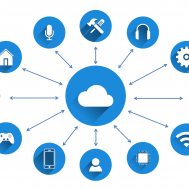Cloud computing could best be described as outsourcing the storage of all your computer applications. Instead of storing files and programs on the computer desktop, they are stored in a section of the Internet that is essentially reserved for you or your business.
Making the switch to cloud computing rids your IT department of the many technological glitches associated with traditional desktop storage. It takes away the need to update malware software and back-up support. However, IT departments will have to make the transition alongside their business if it switches to cloud storage, and become a unit that specializes in cloud technology.
There are several advantages to making this change to your business model: here are the reasons why it’s time to switch to cloud computing.
1. There is no installation required.
Switching to cloud computing saves on the time (and effort) it takes to install programs on your desktop. Cloud computing is faster because it operates with all the capabilities that the Internet, and often with the supplementary materials included in that, like the Flash player.
It optimizes the time it takes to have any Web program developed for a client. This is an advantage as so many modern businesses, regardless of industry, offer digital services to those they conduct business with.
Julien Mordacai, principal of a Carolina consulting firm, says that with cloud computing services, he could have a server functional for a new client within a few hours, although doing the research work to assess a particular planner’s needs and get them fully operating could take a week or two.
2. Lower cost structure.
Financially speaking, switching to cloud computing is more of a “one and done” payment plan, often with packages that set up the applications and programs that need to be run to begin cloud storage. An overall reduction in operating costs can be explained by the fact that most costs are included within the original contract.
Going along with this, cloud storage optimizes use of finances, with more efficient energy consumption and fewer time delays. There is quite a bit more cost maintenance that is associated with desktop storage, since updates constantly need to be installed and security needs to be improved.
Businesses that have transitioned to cloud computing have noted how keeping network computers running smoothly on a desktop, as well as considering software updates and security, can be costly in terms of both time and money.
3. Increased mobile access.
The amount that a business can rely on their data accessibility increases by storing files on the cloud rather than on a desktop. Many jobs require employees to travel for at least part of their duties, and it is not uncommon for travelers to have issues accessing programs stored on a desktop when away from the central business hub.
One investment advisor compared his own job experience with desktop versus cloud, saying: “When I was traveling, I sometimes would have difficulty getting my computer connected to the Internet with all of the proprietary software on my laptop… when I wanted to be able to take care of a client’s business on the spot, but I wasn’t able to. Now, I can do it in an instant.”
While desktop software is largely location-based, Software as a Service (the acronym SaaS) cloud applications only require an Internet connection to gain access to data. This is ideal for most businesses, who can usually say that they will have access to Wi-Fi while traveling for work.
4. The control and flexibility available.
With software being offered as a service, the cloud can change to better store the type and amount of data it may be holding. Cloud storage is constructed to automatically scale itself based on how much data it is currently storing.
Though software is the service that cloud technology provides, a business that switches to cloud computing can choose the amount of control they’ll have over their data storage: Infrastructure as a Service (IaaS), Software as a Service (SaaS) or Platform as a Service (PaaS).
Service providers package cloud capabilities differently based on what a company may be looking for with their storage model. There are also a variety of options for cloud users when it comes to functions like security, storage and resources, so that tools can be chosen to best fit a business.
5. It integrates with everything.
Cloud computing is on the rise, so it should come as no surprise that there are a ton of Internet applications that are compatible with the cloud. Digital providers know that the cloud is the future of data storage, and therefore modify their products to match it.
Examples of some compatible programs that would be supplementary to a business would be calendar apps, point-of-sale systems, team chat apps, and social media.
In this way, cloud computing is moving toward becoming an entirely self-sufficient means of supporting an individual business. Not only can data be stored and accessed, but a lot of digital capabilities that companies would like to offer additionally have been adapted to operate within SaaS operations as well.
What are some more benefits that cloud computing brings to your business? Tweet us @AppleRubber and let us know!
